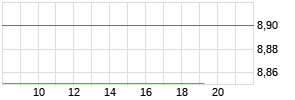
Astellas to Present 12-Week Data from Pivotal Phase 3 SKYLIGHT 1™ Trial of Fezolinetant in Oral Session at the American College of Obstetricians and Gynecologists Annual Meeting
PR Newswire
TOKYO, May 5, 2022
Astellas' investigational nonhormonal treatment meets all primary endpoints, significantly reducing the frequency and severity of vasomotor symptoms associated with menopause
TOKYO, May 5, 2022 /PRNewswire/ -- Astellas Pharma Inc. (TSE: 4503, President and CEO: Kenji Yasukawa, Ph.D., "Astellas") will present 12-week results from the pivotal Phase 3 SKYLIGHT 1™ clinical trial examining the efficacy and safety of fezolinetant, an investigational oral, nonhormonal compound being studied for the treatment of moderate to severe vasomotor symptoms associated with menopause (VMS), on Sunday, May 8, 2022 at the American College of Obstetricians and Gynecologists (ACOG) Annual Clinical and Scientific Meeting in San Diego. VMS, characterized by hot flashes (also called hot flushes) and/or night sweats, are common symptoms of menopause.1,2
Findings showed the SKYLIGHT 1 trial of fezolinetant 30 mg and 45 mg administered once daily met all four co-primary endpoints, demonstrating a statistically significant reduction from baseline in the frequency and severity of moderate to severe VMS at weeks 4 and 12 versus placebo. The safety profile of fezolinetant in SKYLIGHT 1 is aligned with what was previously observed with fezolinetant.3
Fezolinetant is an investigational nonhormonal selective neurokinin 3 (NK3) receptor antagonist that blocks a specific receptor in the temperature control center of the brain (the hypothalamus) to reduce the frequency and severity of moderate to severe VMS associated with menopause.4,5,6,7
"These data are encouraging since menopause-related VMS, which affect more than 50% of women 40 to 64 years of age, can adversely impact daily quality of life," said Genevieve Neal-Perry, M.D., Ph.D., Chair, UNC School of Medicine Department of Obstetrics and Gynecology. "The SKYLIGHT 1 results demonstrate the potential of fezolinetant to reduce the frequency and severity of moderate to severe VMS, which represent some of the most bothersome menopause symptoms."
For the co-primary endpoint of reduction in daily (24 hours) mean frequency of moderate to severe VMS versus placebo, fezolinetant 30 mg demonstrated a -1.87 (p<0.001) and -2.39 (p<0.001) mean change at weeks 4 and 12, respectively. At the 45 mg dose, fezolinetant showed a -2.07 (p<0.001) and -2.55 (p<0.001) mean change at weeks 4 and 12, respectively. Additionally, for the co-primary endpoint of reduction in daily (24 hours) mean severity of moderate to severe VMS versus placebo, fezolinetant 30 mg demonstrated a -0.15 (p=0.012) and -0.24 (p=0.002) mean change at weeks 4 and 12, respectively. The 45 mg dose of fezolinetant showed a -0.19 (p=0.002) and -0.20 (p=0.007) mean change versus placebo at weeks 4 and 12, respectively.
Treatment emergent adverse events (TEAEs) were reported by 37.4%, 43.4% and 44.6% of individuals in the SKYLIGHT 1 trial in the 30 mg, 45 mg and placebo groups, respectively. Headache was the most common TEAE in the fezolinetant groups and was reported by 5.2%, 6.4% and 7.4% in the 30 mg, 45 mg and placebo groups, respectively. Serious TEAEs occurred in less than 2% of patients in the fezolinetant groups.
"The 12-week results of the SKYLIGHT 1 study add to the growing body of evidence supporting the potential clinical benefit of fezolinetant in women who experience moderate to severe hot flashes as part of menopause," said Nancy Martin, M.D., PharmD, Vice President, Global Medical Head, Medical Specialties, Astellas. "Our clinical program reflects Astellas' deep commitment to research and advancing science in areas of unmet need, including women's health."
The safety and efficacy of fezolinetant are under investigation and have not been established. If approved by regulatory authorities, fezolinetant would be a first-in-class, nonhormonal treatment option to reduce the frequency and severity of moderate to severe VMS associated with menopause.
About the BRIGHT SKY™ Phase 3 Program
The BRIGHT SKY pivotal trials, SKYLIGHT 1™ (NCT04003155) and SKYLIGHT 2™ (NCT04003142), enrolled over 1,020 women with moderate to severe VMS. The trials are double-blinded and placebo-controlled for the first 12 weeks followed by a 40-week active treatment extension period. Women were enrolled at over 180 sites within the U.S., Canada and Europe. SKYLIGHT 4™ (NCT04003389) is a 52-week double-blinded and placebo-controlled study designed to investigate the long-term safety of fezolinetant. For SKYLIGHT 4, over 1,800 women with VMS were enrolled at over 180 sites within the U.S., Canada and Europe.
About VMS Associated with Menopause
VMS, characterized by hot flashes (also called hot flushes) and/or night sweats, are common symptoms of menopause.1,2 Worldwide, more than half of women 40 to 64 years of age experience VMS and, in the U.S., about 60% to 80% of women experience these symptoms during or after the menopausal transition.8,9,10,11 VMS can have a disruptive impact on women's daily activities and overall quality of life.1
About Fezolinetant
Fezolinetant is an investigational oral, nonhormonal therapy in clinical development for the treatment of moderate to severe VMS associated with menopause. Fezolinetant works by blocking neurokinin B (NKB) binding on the kisspeptin/neurokinin/dynorphin (KNDy) neuron to moderate neuronal activity in the thermoregulatory center of the brain (the hypothalamus) to reduce the frequency and severity of moderate to severe VMS associated with menopause.7,8,9 The safety and efficacy of fezolinetant are under investigation and have not been established. There is no guarantee the agent will receive regulatory approval or become commercially available for the uses being investigated.
About Astellas
Astellas Pharma Inc. is a pharmaceutical company conducting business in more than 70 countries around the world. We are promoting the Focus Area Approach that is designed to identify opportunities for the continuous creation of new drugs to address diseases with high unmet medical needs by focusing on Biology and Modality. Furthermore, we are also looking beyond our foundational Rx focus to create Rx+® healthcare solutions that combine our expertise and knowledge with cutting-edge technology in different fields of external partners. Through these efforts, Astellas stands on the forefront of healthcare change to turn innovative science into value for patients. For more information, please visit our website at https://www.astellas.com/en.
Cautionary Notes
In this press release, statements made with respect to current plans, estimates, strategies and beliefs and other statements that are not historical facts are forward-looking statements about the future performance of Astellas. These statements are based on management's current assumptions and beliefs in light of the information currently available to it and involve known and unknown risks and uncertainties. A number of factors could cause actual results to differ materially from those discussed in the forward-looking statements. Such factors include, but are not limited to: (i) changes in general economic conditions and in laws and regulations, relating to pharmaceutical markets, (ii) currency exchange rate fluctuations, (iii) delays in new product launches, (iv) the inability of Astellas to market existing and new products effectively, (v) the inability of Astellas to continue to effectively research and develop products accepted by customers in highly competitive markets, and (vi) infringements of Astellas' intellectual property rights by third parties. Information about pharmaceutical products (including products currently in development) which is included in this press release is not intended to constitute an advertisement or medical advice.
References
1 Utian WH. Psychosocial and socioeconomic burden of vasomotor symptoms in menopause: a comprehensive review. Health Qual Life Outcomes. 2005;3:47.
2 Jones RE, Lopez KH, eds. Human Reproductive Biology. 4th ed. Waltham, Mass: Elsevier, 2014.
3 Lederman S, et al. Phase 3 study of fezolinetant for treatment of moderate-to-severe vasomotor symptoms associated with menopause. Presented at the American College of Obstetricians and Gynecologists Annual Clinical and Scientific Meeting; May 8, 2022; San Diego, Calif.
4 Hoveyda HR, Fraser GL, Dutheuil G, et al. Optimization of novel antagonists to the neurokinin-3 receptor for the treatment of sex-hormone disorders (part II). ACS Med Chem Lett. 2015;6:736-740.
5 Depypere H, Timmerman D, Donders G, et al. Treatment of menopausal vasomotor symptoms with fezolinetant, a neurokinin 3 receptor antagonist: a phase 2a trial. J Clin Endocrinol Metab. 2019;104:5893-5905.
6 Fraser GL, Lederman S, Waldbaum A, et al. A phase 2b, randomized, placebo-controlled, double-blind, dose-ranging study of the neurokinin 3 receptor antagonist fezolinetant for vasomotor symptoms associated with menopause. Menopause. 2020;27:382-392.
7 Fraser GL, Hoveyda HR, Clarke IJ, et al. The NK3 receptor antagonist ESN364 interrupts pulsatile LH secretion and moderates levels of ovarian hormones throughout the menstrual cycle. Endocrinology. 2015;156:4214-4225.
8 Makara-Studzinska MT, Krys-Noszczyk KM, Jakiel G. Epidemiology of the symptoms of menopause - an intercontinental review. Przegl Menopauzalny [Menopause Rev]. 2014;13:203-211.
9 Gold EB, Colvin A, Avis N, et al. Longitudinal analysis of the association between vasomotor symptoms and race/ethnicity across the menopausal transition: study of women's health across the nation. Am J Public Health. 2006;96:1226-1235.
10 Freeman EW, Sammel MD, Sanders RJ. Risk of long-term hot flashes after natural menopause: evidence from the Penn Ovarian Aging Study cohort. Menopause. 2014;21:924-932.
11 Williams RE, Kalilani L, DiBenedetti DB, et al. Frequency and severity of vasomotor symptoms among peri- and postmenopausal women in the United States. Climacteric. 2008;11:32-43.
![]() View original content to download multimedia:https://www.prnewswire.com/news-releases/astellas-to-present-12-week-data-from-pivotal-phase-3-skylight-1-trial-of-fezolinetant-in-oral-session-at-the-american-college-of-obstetricians-and-gynecologists-annual-meeting-301540202.html
View original content to download multimedia:https://www.prnewswire.com/news-releases/astellas-to-present-12-week-data-from-pivotal-phase-3-skylight-1-trial-of-fezolinetant-in-oral-session-at-the-american-college-of-obstetricians-and-gynecologists-annual-meeting-301540202.html
SOURCE Astellas Pharma Inc.

Mehr Nachrichten zur Astellas Pharma ADR Aktie kostenlos abonnieren
(Mit der Bestellung akzeptierst du die Datenschutzhinweise)

Hinweis: ARIVA.DE veröffentlicht in dieser Rubrik Analysen, Kolumnen und Nachrichten aus verschiedenen Quellen. Die ARIVA.DE AG ist nicht verantwortlich für Inhalte, die erkennbar von Dritten in den „News“-Bereich dieser Webseite eingestellt worden sind, und macht sich diese nicht zu Eigen. Diese Inhalte sind insbesondere durch eine entsprechende „von“-Kennzeichnung unterhalb der Artikelüberschrift und/oder durch den Link „Um den vollständigen Artikel zu lesen, klicken Sie bitte hier.“ erkennbar; verantwortlich für diese Inhalte ist allein der genannte Dritte.





